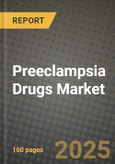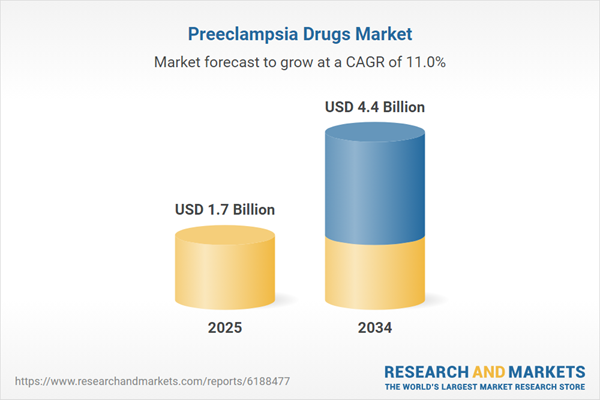The preeclampsia drugs market is evolving rapidly due to increasing awareness about maternal health and the growing prevalence of preeclampsia, a condition that affects 5-8% of pregnant women globally. Preeclampsia, characterized by high blood pressure and organ damage, can lead to severe complications like premature birth, stroke, and organ failure if left untreated. The market for preeclampsia drugs focuses on medications that aim to manage blood pressure, prevent complications, and ensure the well-being of both the mother and fetus. The primary treatments for preeclampsia include antihypertensive drugs and corticosteroids, which help in preventing premature birth. However, with the growing understanding of the condition’s underlying causes, there is a shift towards the development of more specific drugs targeting endothelial dysfunction, immune system abnormalities, and vascular health. As maternal health becomes a global priority, the demand for effective preeclampsia treatments is expected to rise, fostering innovation and investment in this critical area of maternal care.
The preeclampsia drugs market saw advancements in both research and clinical applications. Several pharmaceutical companies focused on improving existing treatments by incorporating new drug delivery systems for better absorption and efficacy. Clinical trials explored novel drugs targeting the root causes of preeclampsia, such as immune system modulation and blood vessel protection, in addition to blood pressure regulation. Furthermore, researchers began exploring more personalized treatments based on genetic and environmental factors, recognizing that preeclampsia manifests differently in individual patients. The market also saw increased interest from the medical community in developing drugs that could delay the onset of preeclampsia, providing more time for interventions to ensure better health outcomes for both the mother and fetus. Despite these advancements, the market faced challenges such as high drug development costs, the complexity of treating a multifactorial disease, and the lack of standardized treatment protocols, which delayed broader adoption of these new therapies.
The preeclampsia drugs market is expected to experience significant growth driven by advancements in precision medicine, genomics, and biotechnology. The market will likely see a greater focus on personalized treatment options, with drug regimens tailored to the specific genetic and environmental factors influencing the progression of preeclampsia. New technologies such as gene therapies and monoclonal antibodies may offer innovative solutions for managing the underlying causes of preeclampsia. Moreover, as more regulatory bodies push for standardized screening and treatment guidelines, the demand for preeclampsia drugs will increase across both developed and emerging markets. Researchers are also investigating the use of natural therapies in conjunction with traditional drugs, potentially offering more holistic and sustainable treatment regimens. The development of new and more effective treatments will address the ongoing need for better management of preeclampsia, providing a significant opportunity for pharmaceutical companies in this space.
Key Insights: Preeclampsia Drugs Market
- Advancements in Precision Medicine: The growing focus on personalized treatment plans based on genetic markers and disease severity will drive the development of tailored preeclampsia drugs.
- Integration of New Drug Delivery Systems: The use of advanced drug delivery systems, such as sustained-release formulations, is increasing to enhance the effectiveness of preeclampsia treatments.
- Rise of Biotech and Monoclonal Antibodies: The application of biotech innovations and monoclonal antibodies targeting the underlying causes of preeclampsia is becoming more prominent in drug development.
- Increased Focus on Early Prevention and Screening: There is a growing emphasis on developing treatments that can prevent or delay the onset of preeclampsia through early detection and intervention.
- Exploration of Natural and Complementary Therapies: Research into combining traditional pharmaceutical treatments with natural or complementary therapies is gaining traction for managing preeclampsia.
- Rising Awareness of Maternal Health: Increased global attention to maternal health and the long-term impact of conditions like preeclampsia is driving the demand for better treatments.
- Technological Advancements in Drug Development: Continuous advancements in biotechnology, genomics, and drug delivery systems are providing new opportunities for more effective preeclampsia drugs.
- Regulatory Push for Better Maternal Care: Governments and regulatory bodies are focusing on improving maternal care, prompting greater investment in preeclampsia drug development.
- Growing Prevalence of Preeclampsia: The increasing number of preeclampsia cases due to factors like advanced maternal age and obesity is accelerating the demand for new treatment options.
- High Development Costs and Regulatory Hurdles: The high cost of developing new drugs, combined with complex regulatory approval processes and the need for extensive clinical trials, remains a significant barrier to faster market growth.
Preeclampsia Drugs Market Segmentation
By Type
- Mild Preeclampsia
- Severe Preeclampsia
By Treatment
- Medication to Lower Hypertension (B.P)
- Corticosteroids
- Anticonvulsants Medication
By Route of Administration
- Oral
- Parenteral
- Other Route of Administration
By Distribution Channel
- Hospital Pharmacy
- Retail Pharmacy
- Online Pharmacies
- Other Distribution Channels
By End-User
- Hospitals
- Specialty Clinics
- Diagnostic Centers
- Other End-Users
Key Companies Analysed
- AbbVie Inc.
- Pfizer Inc.
- Johnson & Johnson Co
- F. Hoffmann-La Roche Ltd.
- Merck & Co. Inc.
- Novartis AG
- Sanofi S.A.
- Celgene Corp
- Thermo Fisher Scientific Inc.
- AstraZeneca PLC
- Abbott Laboratories
- GlaxoSmithKline PLC
- Takeda Pharmaceuticals Company Limited
- Eli Lilly and Company
- Gilead Sciences Inc.
- Amgen Inc.
- Siemens Healthcare GmbH
- Boehringer Ingelheim Group
- Viatris Inc.
- Baxter International Inc.
- Teva Pharmaceutical Industries Ltd.
- Union Chimique Belge SA
- Otsuka Pharmaceutical Co. Ltd.
- Kyowa Kirin Co Ltd.
- Mallinckrodt Pharmaceuticals Limited
- Comanche Biopharma Corp
- Genentech Inc.
- Diabetomics Inc.
Preeclampsia Drugs Market Analytics
The report employs rigorous tools, including Porter’s Five Forces, value chain mapping, and scenario-based modeling, to assess supply-demand dynamics. Cross-sector influences from parent, derived, and substitute markets are evaluated to identify risks and opportunities. Trade and pricing analytics provide an up-to-date view of international flows, including leading exporters, importers, and regional price trends.Macroeconomic indicators, policy frameworks such as carbon pricing and energy security strategies, and evolving consumer behavior are considered in forecasting scenarios. Recent deal flows, partnerships, and technology innovations are incorporated to assess their impact on future market performance.
Preeclampsia Drugs Market Competitive Intelligence
The competitive landscape is mapped through proprietary frameworks, profiling leading companies with details on business models, product portfolios, financial performance, and strategic initiatives. Key developments such as mergers & acquisitions, technology collaborations, investment inflows, and regional expansions are analyzed for their competitive impact. The report also identifies emerging players and innovative startups contributing to market disruption.Regional insights highlight the most promising investment destinations, regulatory landscapes, and evolving partnerships across energy and industrial corridors.
Countries Covered
- North America - Preeclampsia Drugs market data and outlook to 2034
- United States
- Canada
- Mexico
- Europe - Preeclampsia Drugs market data and outlook to 2034
- Germany
- United Kingdom
- France
- Italy
- Spain
- BeNeLux
- Russia
- Sweden
- Asia-Pacific - Preeclampsia Drugs market data and outlook to 2034
- China
- Japan
- India
- South Korea
- Australia
- Indonesia
- Malaysia
- Vietnam
- Middle East and Africa - Preeclampsia Drugs market data and outlook to 2034
- Saudi Arabia
- South Africa
- Iran
- UAE
- Egypt
- South and Central America - Preeclampsia Drugs market data and outlook to 2034
- Brazil
- Argentina
- Chile
- Peru
Research Methodology
This study combines primary inputs from industry experts across the Preeclampsia Drugs value chain with secondary data from associations, government publications, trade databases, and company disclosures. Proprietary modeling techniques, including data triangulation, statistical correlation, and scenario planning, are applied to deliver reliable market sizing and forecasting.Key Questions Addressed
- What is the current and forecast market size of the Preeclampsia Drugs industry at global, regional, and country levels?
- Which types, applications, and technologies present the highest growth potential?
- How are supply chains adapting to geopolitical and economic shocks?
- What role do policy frameworks, trade flows, and sustainability targets play in shaping demand?
- Who are the leading players, and how are their strategies evolving in the face of global uncertainty?
- Which regional “hotspots” and customer segments will outpace the market, and what go-to-market and partnership models best support entry and expansion?
- Where are the most investable opportunities - across technology roadmaps, sustainability-linked innovation, and M&A - and what is the best segment to invest over the next 3-5 years?
Your Key Takeaways from the Preeclampsia Drugs Market Report
- Global Preeclampsia Drugs market size and growth projections (CAGR), 2024-2034
- Impact of Russia-Ukraine, Israel-Palestine, and Hamas conflicts on Preeclampsia Drugs trade, costs, and supply chains
- Preeclampsia Drugs market size, share, and outlook across 5 regions and 27 countries, 2023-2034
- Preeclampsia Drugs market size, CAGR, and market share of key products, applications, and end-user verticals, 2023-2034
- Short- and long-term Preeclampsia Drugs market trends, drivers, restraints, and opportunities
- Porter’s Five Forces analysis, technological developments, and Preeclampsia Drugs supply chain analysis
- Preeclampsia Drugs trade analysis, Preeclampsia Drugs market price analysis, and Preeclampsia Drugs supply/demand dynamics
- Profiles of 5 leading companies - overview, key strategies, financials, and products
- Latest Preeclampsia Drugs market news and developments
Additional Support
With the purchase of this report, you will receive:- An updated PDF report and an MS Excel data workbook containing all market tables and figures for easy analysis.
- 7-day post-sale analyst support for clarifications and in-scope supplementary data, ensuring the deliverable aligns precisely with your requirements.
- Complimentary report update to incorporate the latest available data and the impact of recent market developments.
This product will be delivered within 1-3 business days.
Table of Contents
Companies Mentioned
- AbbVie Inc.
- Pfizer Inc.
- Johnson & Johnson Co
- F. Hoffmann-La Roche Ltd.
- Merck & Co. Inc.
- Novartis AG
- Sanofi S.A.
- Celgene Corp
- Thermo Fisher Scientific Inc.
- AstraZeneca PLC
- Abbott Laboratories
- GlaxoSmithKline PLC
- Takeda Pharmaceuticals Company Limited
- Eli Lilly and Company
- Gilead Sciences Inc.
- Amgen Inc.
- Siemens Healthcare GmbH
- Boehringer Ingelheim Group
- Viatris Inc.
- Baxter International Inc.
- Teva Pharmaceutical Industries Ltd.
- Union Chimique Belge SA
- Otsuka Pharmaceutical Co. Ltd.
- Kyowa Kirin Co Ltd.
- Mallinckrodt Pharmaceuticals Limited
- Comanche Biopharma Corp
- Genentech Inc.
- Diabetomics Inc.
Table Information
| Report Attribute | Details |
|---|---|
| No. of Pages | 160 |
| Published | October 2025 |
| Forecast Period | 2025 - 2034 |
| Estimated Market Value ( USD | $ 1.7 Billion |
| Forecasted Market Value ( USD | $ 4.4 Billion |
| Compound Annual Growth Rate | 11.0% |
| Regions Covered | Global |
| No. of Companies Mentioned | 28 |









